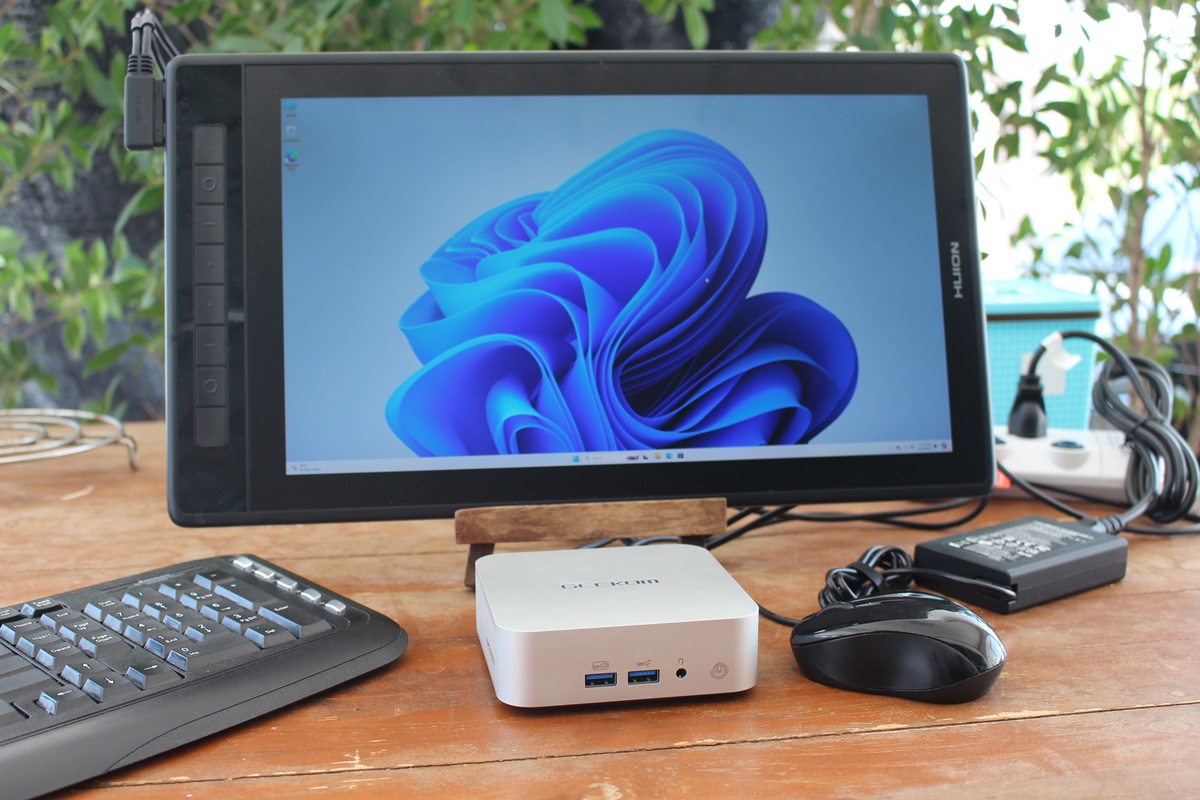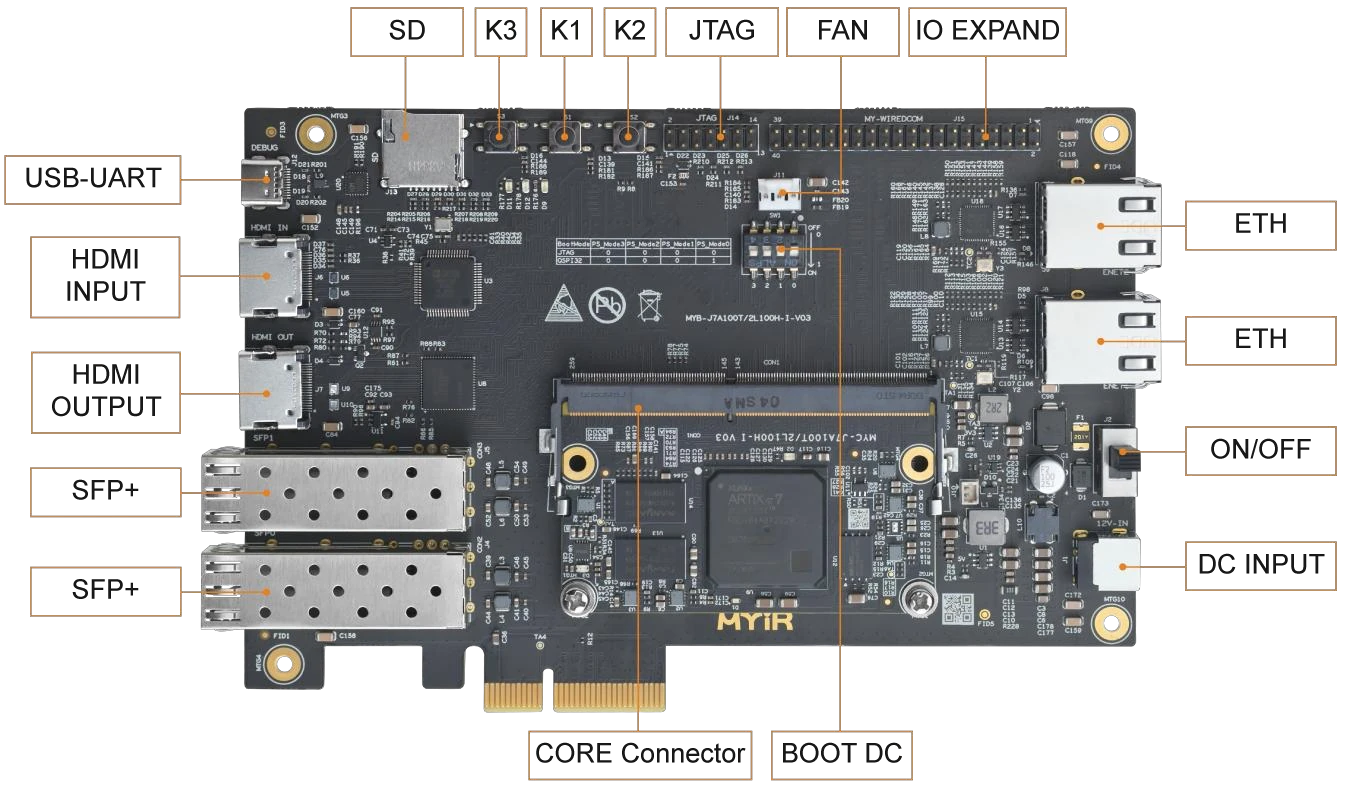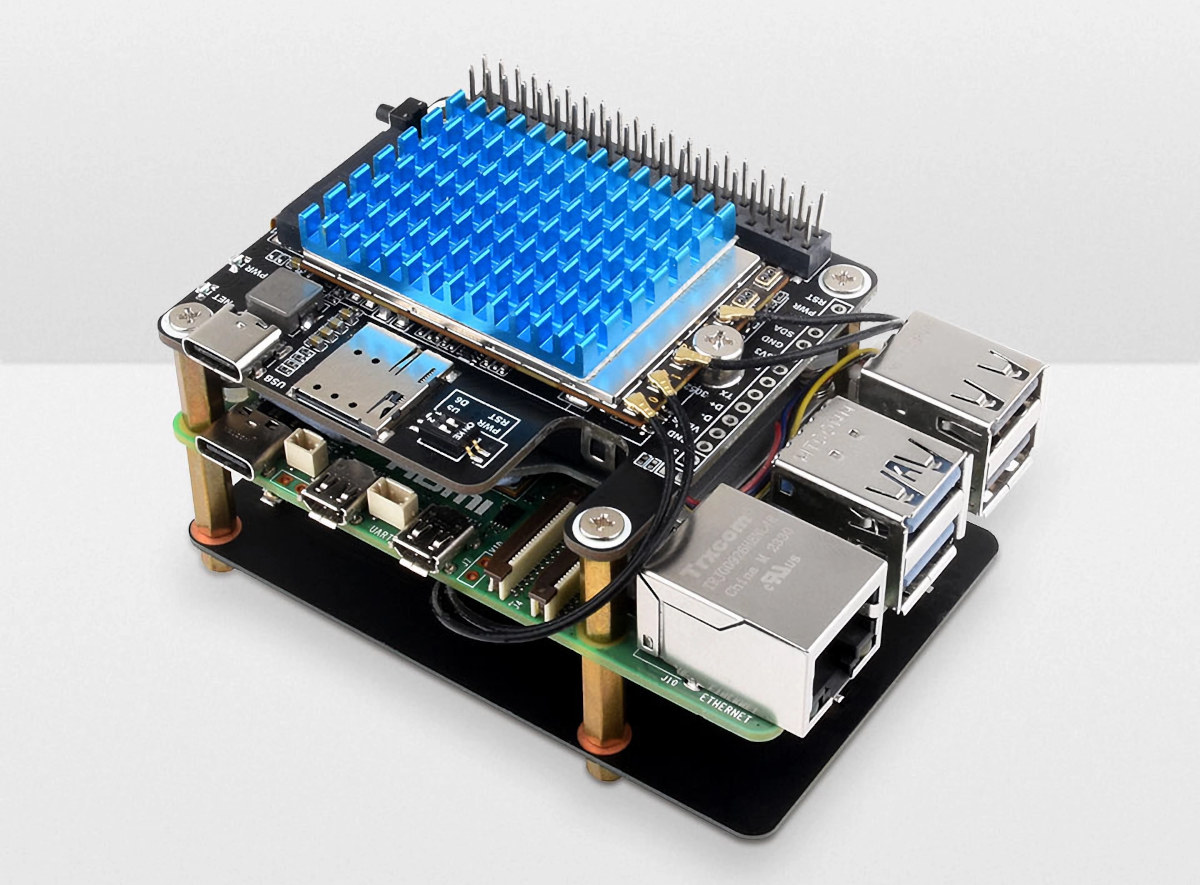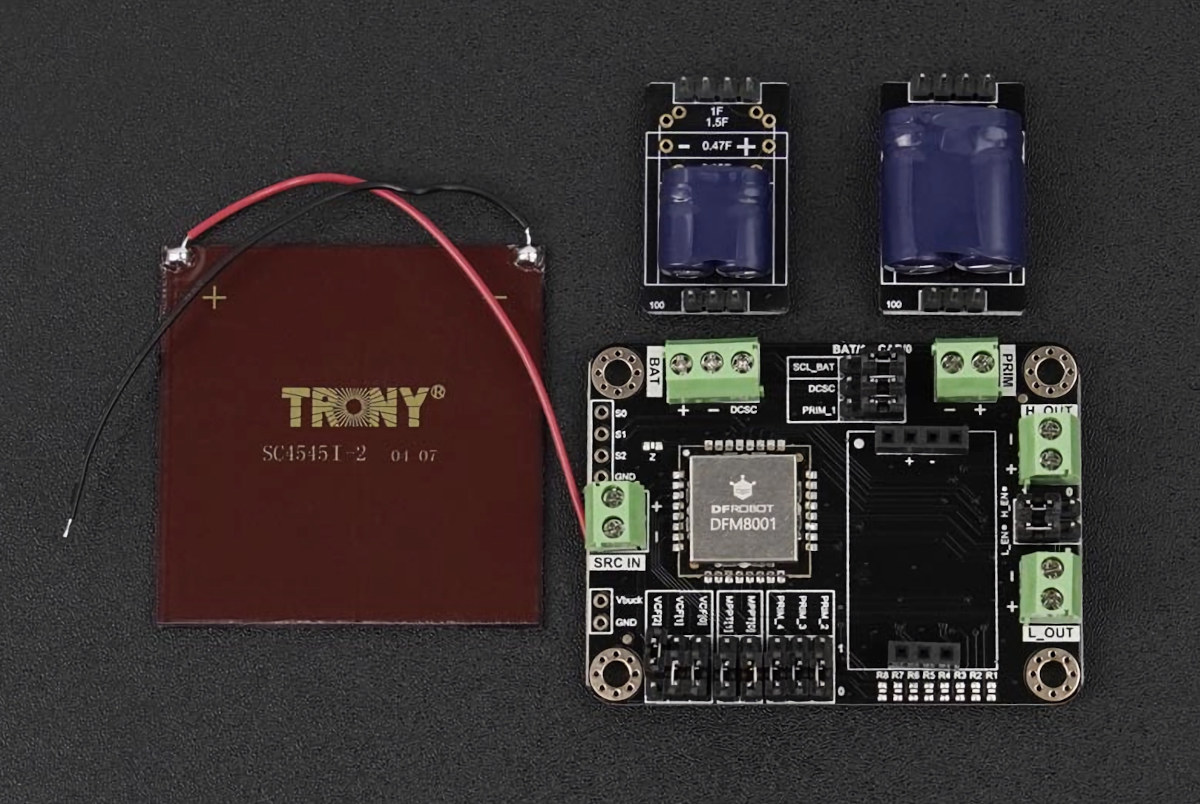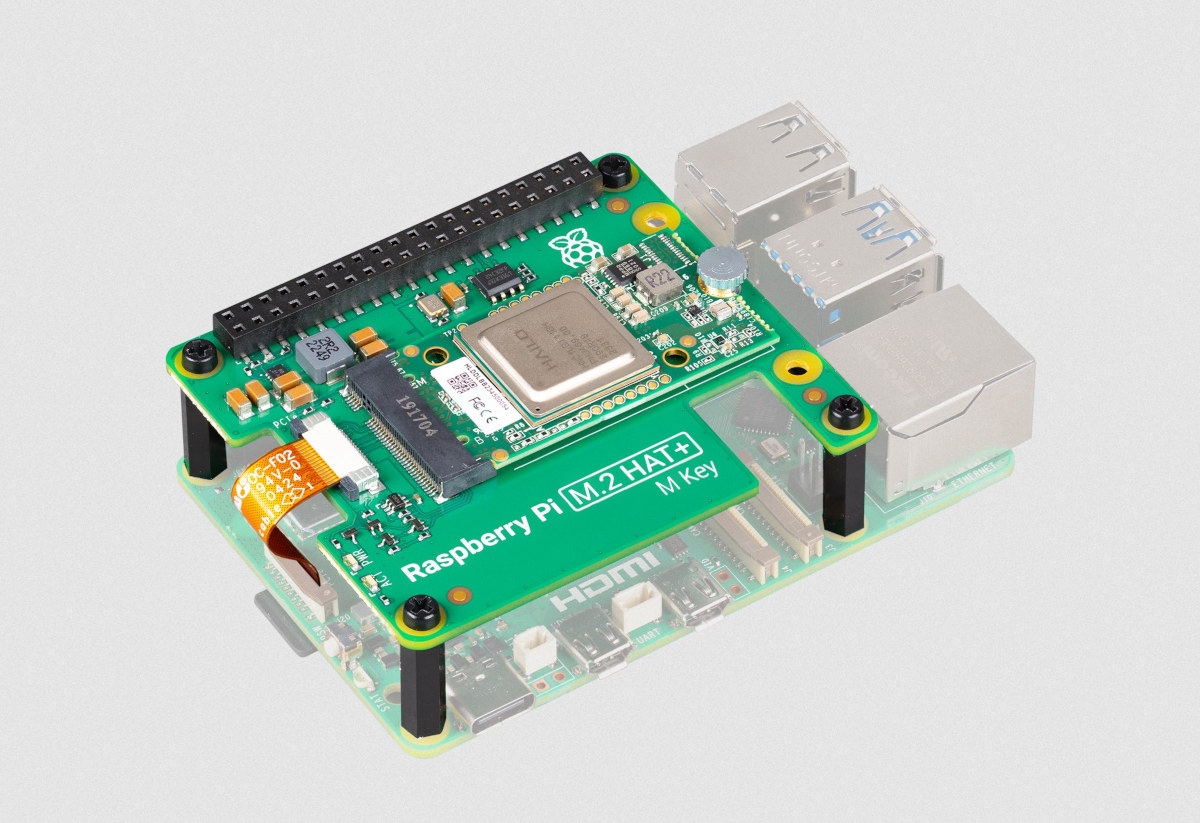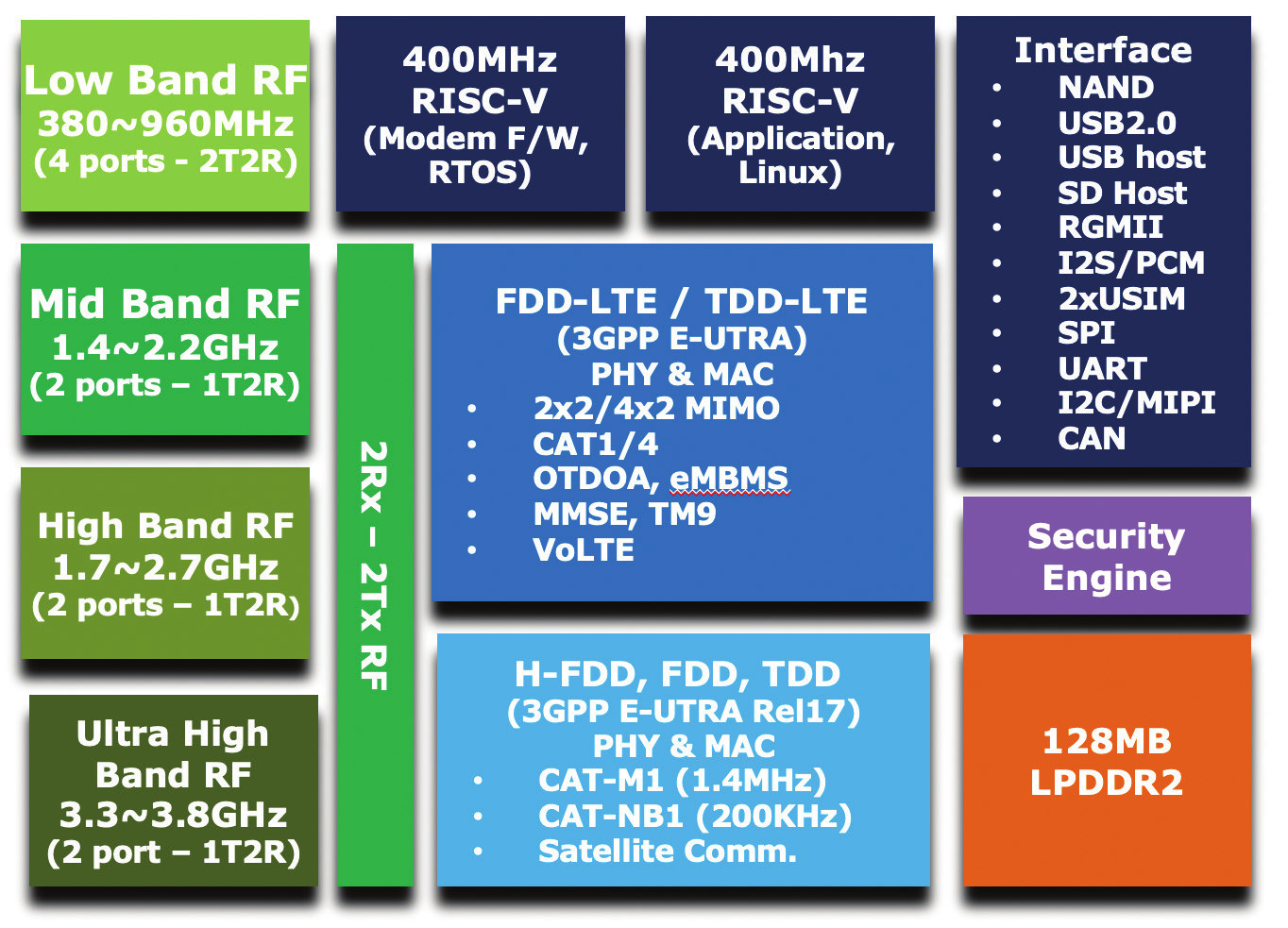In the first part of the review, we’ve already gone through a teardown and an unboxing of the GEEKOM A8 AI mini PC powered by an AMD Ryzen 9 8945HS processor with AMD Radeon 780M Graphics, 32GB RAM (upgradeable up to 64GB) and a 2TB M.2 NVMe SSD. We’ve now had more time to play with the GEEKOM A8, so we will report our experience with the Windows 11 Pro operating system in the second part of the review testing features, running benchmarks, evaluating networking and storage performance, testing the thermal design, and taking measurements for fan noise and power consumption. Software overview and features testing The System->About window in the Settings confirms we have an A8 Mini PC powered by a 4.0 GHz (base frequency) AMD Ryzen 9 8945HS processor with Radeon 780M Graphics and 32GB of RAM running Windows 11 Pro 23H2 build 22631.3593. HWiNFO64 provides more details […]
MYiR Tech launches AMD XC7A100T Artix-7 FPGA system-on-module and development board with PCIe, SFP+ cages, dual GbE
MYIR MYC-J7A100T is a System-On-Module (SoM) powered by an AMD/Xilinx Artix-7 XC7A100T FPGA with up to 101,440 logic cells, 512MB DDR3 memory, 32MB QSPI FLASH, 32KB EEPROM, DC-DC power management, and other integral circuits in a compact 69.6 x 40mm form factor. The module exposes up to 178 FPGA I/Os, four pairs of GTP high-speed transceiver interfaces, and a JTAG interface through its 260-pin edge connector. MYiR also provides a development board for the MYC-J7A100T module which looks like a PCIe 2.0 card and comes with SFP+ cages, HDMI input and output ports, dual GbE, and a GPIO expansion header. MYIR MYC-J7A100T system-on-module Specifications: FPGA – AMD/Xilinx XC7A100T Artix-7 FPGA (XC7A100T-2FGG484I) with 101,440 logic cells 4,860 Kb of Block RAM 240 DSP slices 8 GTP transceivers capable of reaching speeds up to 6.6Gb/s PCIe Gen2 x4 interface Up to 300x single-ended I/Os System Memory – 512MB DDR3 Storage – 32MB […]
PCIe to 5G HAT+ for Raspberry Pi 5 takes SIMCom and Quectel 5G modules
Waveshare PCIe to 5G/4G/3G HAT+ for Raspberry Pi 5 is a PCIe Gen 2 x1 to M.2 HAT+ designed to take 5G modules from SIMCom and Quectel and a Nano SIM card. The kit ships with a 4-in-1 PCB antenna, associated cables, a heatsink, a 4cm 16-pin PCIe FPC cable, a 40-pin female header, and a fixture set for mounting. We had previously written about the SixFab 5G HAT for the Raspberry Pi 5 with a Quectel RM502Q-AE M.2 module, but this specific kit still relies on the USB 3.0 interface. The Waveshare kit is the first 5G kit using the PCIe interface from the Raspberry Pi 5 interface and it is offered with Quectel RM502Q-AE, RM530N-GL, RM520N-GL, or SIMCom SIM8262E-M2, SIM8262A-M2 M.2 3042/3052 modules. Waveshare PCIe to 5G HAT+ specifications: M.2 Key B socket for 3042/3052 5G modules with PCIe interface 16-pin PCIe FPC connector directly connected to the […]
DFM8001 indoor energy harvesting kit harnesses solar energy (and mechanical, thermal, RF energy with extra hardware)
DFRobot DFM8001 indoor ambient energy harvesting kit can power IoT devices by harnessing solar energy, and the company claims it can also capture mechanical, thermal, and RF energy from the local environment but there’s no way to do that with that kit without additional hardware. The DFRobot kit is comprised of an evaluation board with the company DFM8001 energy harvesting module, two pluggable supercapacitors, and a solar panel used as power input. You could also use other sources emitting at least 150 mV gathering energy from RF, thermal, or mechanical sources. The board features two outputs one low-voltage (1.2-1.8V) terminal up to 20mA, and a high-voltage (1.8V-4.1V) terminal up to 80mA, and two battery connectors plus a few jumpers for configuration. DFM8001 energy harvesting kit specifications: Operating voltage – 3.3V to 5.5V DC Cold start condition – Input > 400mV 15uW Sustaining voltage after cold start – 150mV. Input voltage […]
$70 Raspberry Pi AI Kit combines official M.2 HAT+ with Hailo-8L AI accelerator
Raspberry Pi Limited has just launched the “Raspberry Pi AI Kit” comprised of the official M.2 Key M HAT+ and a 13 TOPS Hailo-8L M.2 AI accelerator module and selling for $70 through distributors. We had seen Raspberry Pi showcase an AI camera at Embedded World 2024, so when I received an email from a representative about a “Raspberry Pi AI Kit” I thought it would be the announcement about the camera. Instead, it’s a kit comprised of existing parts with the most interesting aspects being the price and availability (hopefully) since Hailo-8/8L accelerators are mostly found in more expensive embedded/industrial solutions, and easier documentation to get started. Raspberry Pi AI Kit highlights: Support SBC – Raspberry Pi 5 M.2 HAT+ with PCIe Gen2 x1 interfaces, M.2 Key M support, Hailo-8L AI accelerator with Up to 13 TOPS of performance M.2 2242 form factor Typical power consumption – 1.5W Thermal […]
GCT GDM7243SL is a dual-core RISC-V 5G/4G LTE modem with support for NTN, NB-IoT, LTE Cat M, Cat1bis, Cat1 and/or Cat4
CT Semiconductor Holding GDM7243SL is a multi-mode 5G/4G LTE IoT modem with two 400 MHz RISC-V cores capable of operating in Cat 4, Cat 1bis, Cat M1, Cat NB1/NB2 (NB-IoT) and non-terrestrial networks (NTN) in order to work anywhere on earth. If I remember correctly, one of the first commercial RISC-V SoCs I saw was a storage controller from Western Digital introduced in 2019. But since then, we’ve seen more and more RISC-V chips come to market from entry-level microcontrollers up to Linux-capable application processors, and even chips for datacenters that are out of the scope of topics covered on CNX Software. But with GDM7243SL, I think it’s the first time I’ve encountered a RISC-V modem, so let’s have a closer look. There are two models, the GDM7243SL1 and GDM7243SL2, with different memory and storage options, and the L1 lacks support for LTE Cat 4. GDM7243SL key features: CPU 400 […]
SBC software news – Armbian 24.5.1, DietPi 9.4, and Otii server for the Raspberry Pi 4/5
There’s been some notable software news for single board computers (SBCs) in the last few weeks with the release of Armbian 24.5.1 Havier with a focus on stability and UX improvement, the release of DietPi 9.4 lightweight Debian distritions for SBCs, and Otii server, the software for Qoitech Arc power supply, meter, and DAQ, has been finally released for the Raspberry Pi 4/5. Armbian 24.5.1 Havier Armbian announced 24.5.1 Havier on May 25 with bug fixes and improvements as a point release, but also some new boards. Here are some of the highlights. New boards Orange Pi 5 Pro FriendlyElec CM3588 NAS board Radxa ROCK 5 ITX Radxa Zero 3E/3W Avaota A1 SBC SK-AM68 board tqma8mpxl board CSC Hinlink H6xk boards RK3588-based Cool Pi CM5 EVB Improve Khadas support Resolve Rockchip patch maintenance nightmare Add functionality to freeze git resources Improve support for Radxa Rock S 0 and test USB […]
Mekotronics R57 – A Rockchip RK3576 Edge AI fanless mini PC with HDMI input/output, dual GbE, RS232, RS485, DIO…
Mekotronics R57 is a fanless edge AI mini PC powered by a Rockchip RK3576 octa-core Cortex-A72/A53 SoC with a 6 TOPS NPU, 4GB LPDDR5, a 32GB eMMC flash, and features such as RS485 and dual gigabit Ethernet that makes it suitable for industrial automation. I initially thought it was a cost-down version of the Mekotronics R58 mini PC that I reviewed with Android 12 as my first ever Rockchip RK3588 device. But while the mechanical design is similar and some of the ports are in the same position, there are some changes with the new model equipped with only one HDMI output, one HDMI input, two GbE jacks, and a terminal block with RS232, RS485, and digital inputs and outputs. Mekotronics R57 specifications: SoC – Rockchip RK3576 CPU 4x Cortex-A72 cores @ 2.2GHz, four Cortex-A53 cores @ 1.8GHz Arm Cortex-M0 MCU at 400MHz GPU – ARM Mali-G52 MC3 GPU with […]


